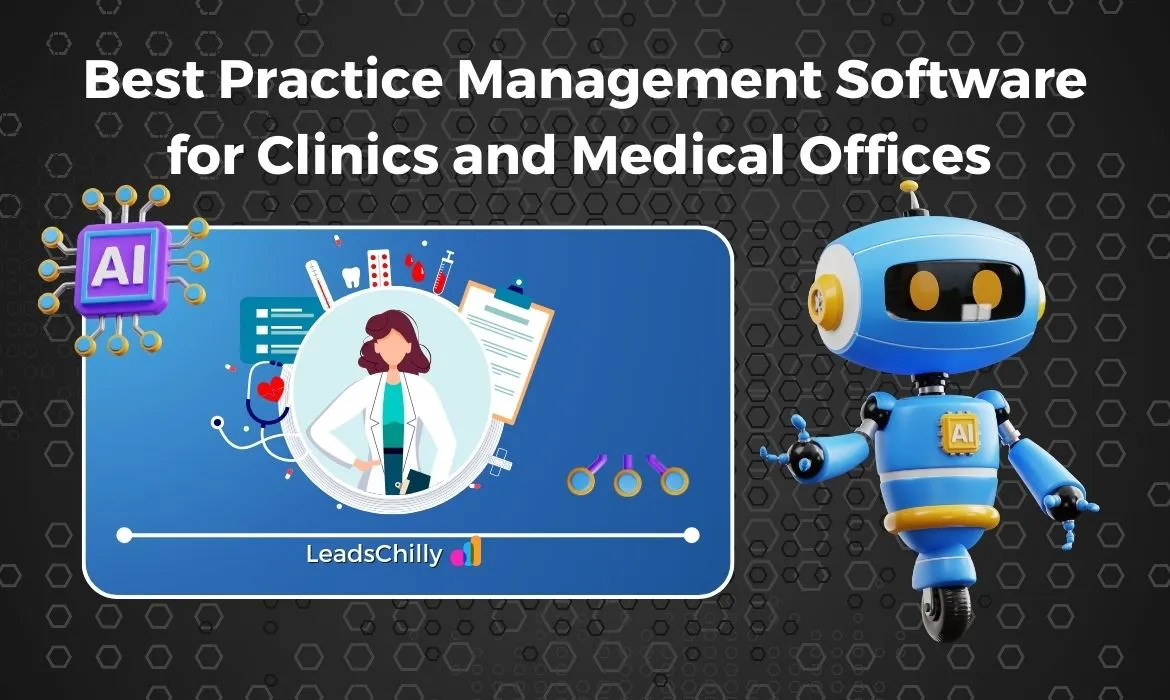Clinic and Medical Office Management System Currently, there is a strong focus on efficiency and effectiveness in the healthcare field, as clinics and medical offices strive to provide the best service to their patients. Probably the most efficient approach to the problem is the choice of proper software for clinics. This practice management software is aimed at simplifying all the operational processes, elevating the patient experience, and optimizing your practice.
As per the recent report, “The global medical scheduling software market size is expected to be worth USD 954.3 million by 2029 from USD 502.88 million in 2024, growing at a CAGR of 13.67% during the forecast period.” It shows the increasing demand for clinical software.
In this blog, we will discuss the importance of software for clinics, key features, and how it improves efficiency and patient care. We also guide you in choosing the best software for your needs.
Why Your Clinic Needs the Best Practice Management Software
1. Streamlined Operations
Management is the foundation of every clinic and is thus an essential part of every clinic. Appointment setting, billing, and documentation are some of the clerical activities that can be dispensed by clinic management software. It not only enhances the operational effectiveness of the clinic but also minimizes the likelihood of human mistakes to ensure that your clinic runs smoothly each day.
2. Enhanced Patient Experience
Patients also expect more from their healthcare providers than in the past, so enhancing patient satisfaction is crucial here. The management software for practicing concerns the appointments, medical history, and reminders to make the patients feel important at every clinic. The clinic that is smoothly managed is easily remembered by the patients, and hence they will have increased loyalty.
3. Data Security and Compliance
As information security has become more central in the recent past, patient data is information that needs to be safeguarded. The effective management of a clinic requires maintaining patient data and its privacy while collecting it in compliance with legislation like HIPAA. Look for products that include data encryption, data backup, and cloud security as part of the program features.
4. Improved Billing and Revenue Cycle Management
The financial health of a clinic is as vital as the actual health of a patient in the clinic. The correct clinic software includes features like billing, invoicing, insurance claim processing, etc. for the clinic. This makes it easier for your clinic to manage the revenue cycle, thus recovering patient charges without a burden.
Key Features to Look for in Practice Management Software
When choosing the best practice management software for clinics, consider these essential features:
1. Appointment Scheduling and Management
The need for a detailed appointment scheduling system cannot be overemphasized. Choose a software solution that will enable patients to make appointments, reschedule them, or cancel them. For instance, features like auto-reminders, calendar sync, and real-time availability cut down on no-show rates and improve patient satisfaction.
2. Comprehensive Billing and Invoicing
Your clinic’s software must make billing as easy as possible and should include invoicing and insurance claims. Ensure that billing is integrated with the patient record system so that you are able to easily monitor charges and balances due by patients.
3. Patient Record Management
Managing patient records is a crucial aspect that should not be overlooked in any clinic. Select software for management that will allow you to manage patient data and update the information as soon as possible and securely. Integrated EHR (Electronic Health Records) functionality can also enhance this process, as all patient-related information will be collected and accessible.
4. Reporting and Analytics
As for the need to implement data-driven decision-making, the software for clinics should contain rich reporting and analytics features. They enable one to monitor essential parameters such as patient improvement, the number of appointments, and the clinic’s financial status, where one can recognize inefficiencies in the clinic.
5. Telemedicine Capabilities
Since the advancement of virtual care, most clinics have adopted telemedicine services. Check that your practice management software allows for video consultations, secure messaging, and the sharing of documents to ensure you can continue to provide adequate care for patients remotely.
How to Choose the Best Practice Management Software for Your Clinic
Choosing the right software for clinics can be overwhelming, with so many options available. Here are some key considerations to guide your decision:
- Practice Size: Some of the additional capabilities may be necessary for larger clinics, for example, support for multiple locations, while others may be valuable for smaller clinics, for example, lower costs and simplicity.
- Budget: It is imperative to consider the cost of purchasing the software and the cost of subscribing to it when choosing practice management software. Be sure to identify the software that will be the most cost-effective given the features required.
- Ease of Use: The software should be easily understandable by every staff member, thereby negating the need for much training. Search for demos or trials of the software to confirm that it is easy to use.
- Customer Support: Customer support is also important, especially during the initial stages of the setup process. Make sure the provider of the software is willing to provide support after the sale.
- Scalability: The growth of your clinic should be mirrored by the growth of your software, in terms of both complexity and scale. Ensure that the software supports a growth plan because your clinic is likely to expand in the future. Choosing the right software for clinics is not an easy task because there are a lot of programs available on the market.
Conclusion
Purchasing the best clinic management software is essential for optimizing the flow of your clinic, patient satisfaction, and the protection of information. If you are a small clinic that looks to streamline its work or a large medical office that wants to introduce new features such as telemedicine, the choice of software can be crucial.
In light of these considerations, and with regard to the size, budget, and desired features of your clinic, you will be able to choose the software for clinics that will help your practice grow and thrive.
Are you ready for the latest advancements in clinic management? Visit our official site, Leadschilly.com, the leading management software solution, and start improving your clinic’s operations right now!
FAQs
1. What is practice management software?
Practice management solutions can be used in clinics and medical offices to ease operations, including appointment setting, billing, documentation, and others.
2. How does practice management software improve patient care?
It enhances the quality and efficiency of patient care by keeping track of schedules and records, leaving the doctors to attend to the patients most of the time rather than being tied down to paper work.
3. Can practice management software help reduce billing mistakes?
Yes, it makes the billing process less prone to mistakes and causes insurance companies and patients to pay faster.
4. What features should I look for in practice management software?
Check for basic elements that include appointment management, financial processing, record keeping, telemedicine capabilities, and staff support.
5. Is practice management software hard to use?
Most modern software is designed to be user-friendly, so it’s easy to learn and use even for those who are not tech-savvy.




Comments are closed.